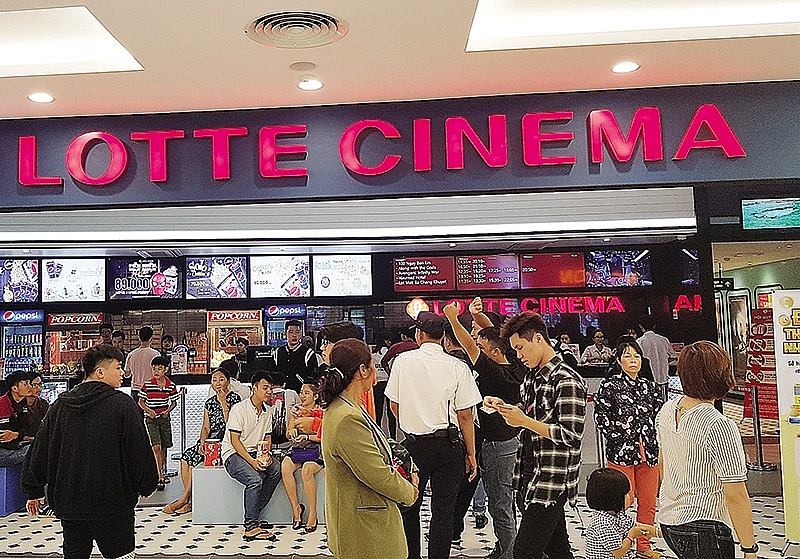Foreign players dominate blossoming cinema scene
 |
| The foreign operators CGV and Lotte Cinema are outclassing local competitors in services and screening rights, Photo: Le Toan |
Market under foreign control
According to statistics from the Vietnam Film Distribution Association (VFDA), cinemas in Vietnam reached VND3.22 trillion ($142.47 million) in revenue in 2017, up 13.6 per cent on-year. South Korean conglomerate CJ’s CGV Vietnam, the leading film distributor and movie theatre operator in the country, makes up 45.3 per cent of this, exceeding the cumulative market share of its four largest competitors, Lotte Cinema (18.2 per cent), Galaxy (12 per cent), BHD Star Cineplex (7.7 per cent), and the National Cinema Centre (NCC – 5.0 per cent).
As of early August this year, CGV Vietnam was operating 64 cineplexes in 22 cities and provinces nationwide. Aside from major cities such as Hanoi, Ho Chi Minh City, Danang, Can Tho, and Haiphong, CGV has 23 sites in 17 provinces with a total of 103 screens and 13,904 seats. Currently, CGV Vietnam is a pioneer in expanding cinemas in remote areas. According to its plan, until 2020, CGV Vietnam will open 10-15 sites per year, four to five of which will be located in rural areas.
The runner-up is Lotte Cinema, which currently manages 40 cineplexes with 150 screens and over 20,000 seats. Its cineplexes cover several remote provinces. The operator plans to open an additional two cinemas in the central provinces of Ninh Thuan and Quang Nam.
Meanwhile, BHD only has eight sites, in Ho Chi Minh City, Thua Thien-Hue, and Hanoi. Galaxy operates 14 cineplexes in the country, and Beta, which operates budget cinemas, has nine.
While foreign movie theatre chains, with their modern equipment and professional staff, have for long taken the market from domestic players, which is seen in the closing of the bulk of Platinum movie theatres, the battle for customers is far from over.
In addition to their overwhelming advantage in the number of cinemas, foreign film distributors and cineplex operators hold the screening rights of most Hollywood film studios.
Notably, thanks to the support of its parent company CJ Group, CGV Vietnam is currently one of the leading film distributors in Vietnam of movies produced by US studios, including UPI, Pixar, Disney, and Warner Bros. Furthermore, CGV Vietnam also holds exclusive distribution rights to the movies of Hollywood’s two biggest film studios, International Pictures and Buena Vista International.
Meanwhile, local companies as well as startups, with their limited finances and no backing by big corporations, struggle to obtain the screening rights to Hollywood blockbusters.
In February 2017, Vincom Retail announced the termination of its contract with MVP Co., Ltd., the company managing the Platinum movie theatre chain. Accordingly, from February 24, three of five Platinum theatres in Hanoi stopped operating and had to start procedures to return the space to Vincom Retail.
Along with Platinum, Beta also closed a cinema in Ho Chi Minh City.
 |
| Foreign players dominate blossoming cinema scene |
The potential is still large
With an annual growth rate of 25-30 per cent, the Vietnamese film market still offers plenty of space to accommodate newcomers.
Danny Quach, BHD’s director of marketing, told VIR, “The local cinema market is forecast to grow by 25-30 per cent annually. This is a positive sign for all cinema operators, but a special challenge for local players like BHD.”
According to CGV Vietnam’s general director Sim Joon Beom, the Vietnamese movie industry will grow much larger in the future. While annual admissions in South Korea were around 250 million, in 2017 the figure was roughly 45 million in Vietnam and is expected to reach 54 million in 2018.
Beom also told VIR, “CGV Vietnam will be continuously showing its growth potential to the stakeholders of this industry and will become a role model cinema operator and distributor, not only from a business point of view but also in corporate social responsibility. In addition, we are developing a long-term plan to support local and startup filmmakers. I hope this is good news for the companies who are concerned about the competition.”
Quach also told VIR, “To contribute to the film market’s development, BHD always supports new film directors, actors and actresses, screenwriters, and new film projects.”
Film distributors and movie theatre operators’ focus on bringing in state-of-the-art cinema technology to Vietnam as well as increasing the distribution of blockbusters to lure in great crowds, creating a basis to expand their operations.
The parking lots in the cineplexes of CGV Vietnam as well as NCC are crowded. Especially on weekends and special holidays, all tickets are sold out several hours before the showing time.
Thanks to the great market potential, local players and startups like Beta still have opportunities to burrow deeper into the sector. The core factor is that they have to come up with suitable development plans to meet customers’ entertainment demand.
“There is no point for existing players to try to compete against one another because there is still potential for growth, with plenty of space for everyone,” Beom added.
Based on his views, to boost the development of the film industry, cinema operators should take on three key tasks, including building world-class cinema infrastructure nationwide, diversifying movie genres, and nurturing movie talents.
“Diversifying movie genres also carries a lot of risk because we have to introduce new types of films constantly. However, new things always need pioneers to explore and take risks. Otherwise, the film industry will be mired down in boredom or grow much more slowly than it could,” Beom added.
Unhealthy competition?
CGV Vietnam’s dizzying speed of growth has raised concerns about unhealthy completion. Over the past few years, the VFDA has been constantly sending complaints on the issue to government agencies. Most recently, relating to Phuong Nam Cultural JSC’s divestment from CGV Vietnam, the association also sent complaints to the Ministry of Finance.
Accordingly, along with expressing doubts about Phuong Nam’s divestment at a shockingly low price, the VFDA also raised questions about the financial situation of the joint venture. According to the document, there are numerous points of concern in CGV Vietnam’s operations “that need to be clarified.”
Two years ago, CGV Vietnam was accused of unfair profit sharing during the distribution of Vietnamese films through its extensive cinema chain. Notably, the VFDA, eight domestic film producers, and distributors claimed that with its overwhelming number of cinemas in the market, CGV Vietnam put them at a disadvantage by using its market dominance to claim an unreasonable share of the box office revenue from the Vietnamese films it screens and distributes.
At that time, Luu Hanh, CGV Vietnam’s chief communications officer, replied that the commission rate complained about was completely unfounded. She remained firm that CGV always obeys Vietnamese regulations on film distribution and presentation.
Regardless of unhealthy competition decried by smaller cinema operators, local customers are pleased with CGV Vietnam’s products and services. Vietnamese people’s preference for Hollywood blockbusters may help keep the South Korean giant in the lead for a long time.
What the stars mean:
★ Poor ★ ★ Promising ★★★ Good ★★★★ Very good ★★★★★ Exceptional
 Tag:
Tag:
Related Contents
Latest News
More News
- Foreign leaders extend congratulations to Party General Secretary To Lam (January 25, 2026 | 10:01)
- 14th National Party Congress wraps up with success (January 25, 2026 | 09:49)
- Congratulations from VFF Central Committee's int’l partners to 14th National Party Congress (January 25, 2026 | 09:46)
- 14th Party Central Committee unanimously elects To Lam as General Secretary (January 23, 2026 | 16:22)
- Worldwide congratulations underscore confidence in Vietnam’s 14th Party Congress (January 23, 2026 | 09:02)
- Political parties, organisations, int’l friends send congratulations to 14th National Party Congress (January 22, 2026 | 09:33)
- Press release on second working day of 14th National Party Congress (January 22, 2026 | 09:19)
- 14th National Party Congress: Japanese media highlight Vietnam’s growth targets (January 21, 2026 | 09:46)
- 14th National Party Congress: Driving force for Vietnam to continue renewal, innovation, breakthroughs (January 21, 2026 | 09:42)
- Vietnam remains spiritual support for progressive forces: Colombian party leader (January 21, 2026 | 08:00)






















 Mobile Version
Mobile Version